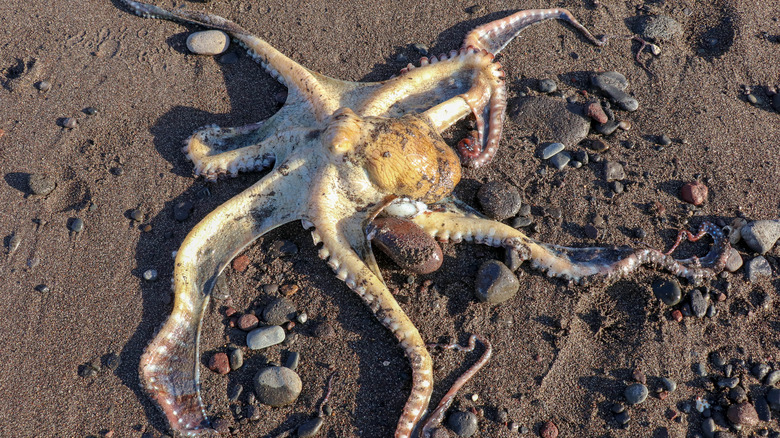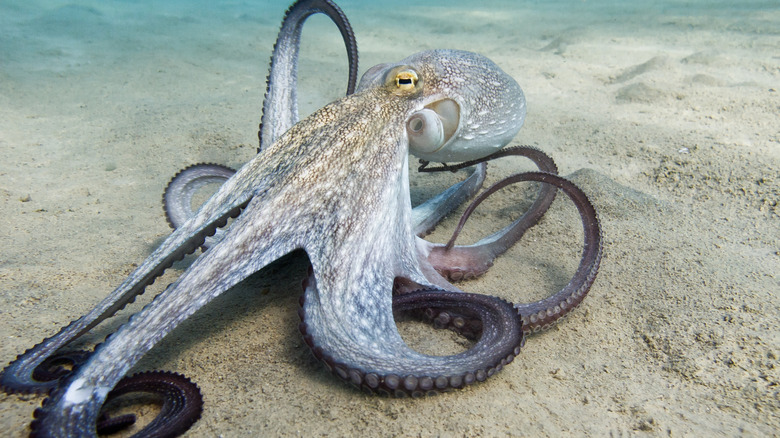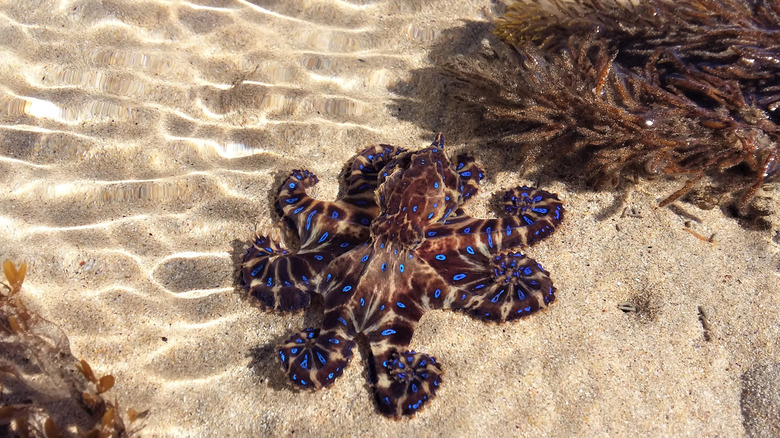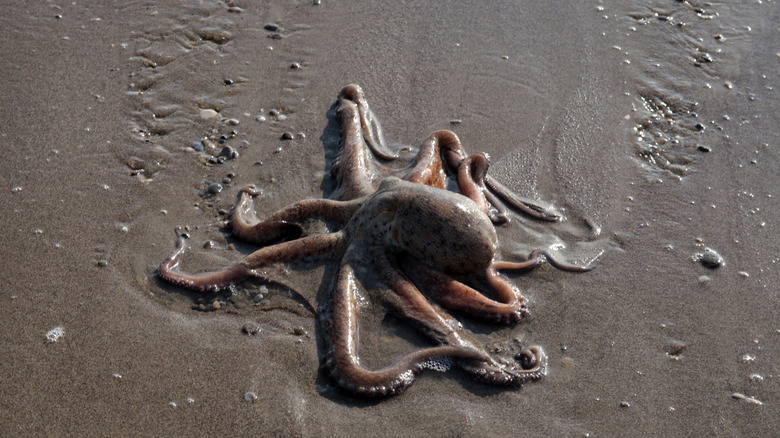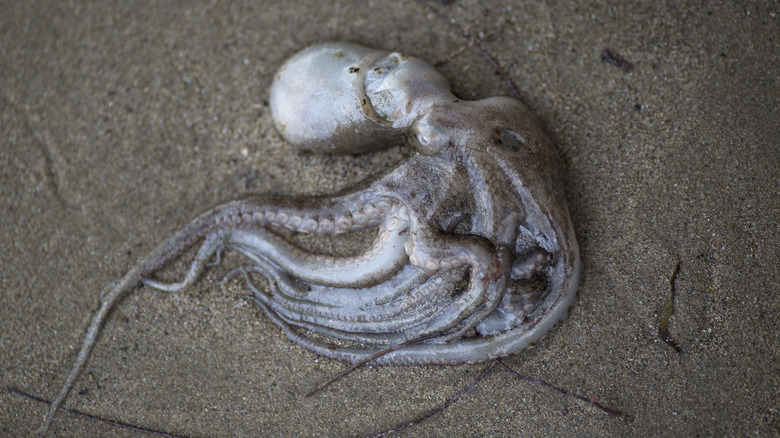The Terrifying Thing You Didn't Know Octopuses Could Do
When it comes to terrifying deep-sea creatures, octopuses are pretty intense. They're crafty, camouflaged, intelligent hunters who hide their tentacles in various disguises. The ever-elusive octopus has been known to change color, pattern, and shape, effectively transforming itself into seemingly meek sea creatures (via Live Science) for the sake of deception. This means that any unsuspecting piece of rock or coral could actually be an octopus waiting in the wings to latch onto its prey with arms full of tentacles and a mouth full of venom. But you already know this.
For you, the 300+ currently discovered octopus species (via National Geographic) come together to create one really good reason to remain safely on the land. You sit primly, toes curled in sand, watching the buoying waves from perhaps the safest place possible: your beach chair. From here, you have a bird's eye view of all the fantastic vacation scenery, from passing boats gliding over crystal waters to looming roller coasters on the boardwalk and families gleefully gathered on the piers. But hold on — there is one other thing that groups of octopuses have been known to come together and do from time to time.
Sometimes groups of octopuses walk out on the beach together
Perhaps you've heard of the phenomenon of octopuses slinking their way right out of the sea and onto dry land. BBC Earth has presented some rather chilling video footage of such events (posted on YouTube). There are some species of octopuses that can walk around along the sandy shoreline, propelling their spherical bodies forward with hundreds of tiny tentacles that now do the work of toes. This isn't a mishap or a navigational error, either. The walk is part of this maritime animal's hunting ritual. BBC Earth goes on to explain that the particular type of octopus they filmed has adapted to be equally "stealthy" upon land and sea.
While one octopus hunting on the sandy banks of the shoreline is certainly noteworthy, what about 20? In a separate, startling incident that took place on the Welsh Coast, witnesses told BBC that not one, not two, but dozens of octopuses walked right out of the ocean together. Some of them did not survive the journey, their rotting corpses left behind as eerie evidence. Still others did live to return to the sea. What makes the event remarkable is the fact that scientists still don't know why it occurred or if it can or will happen again.
More than 20 octopuses walked the beaches three nights in a row
One witness, a dolphin enthusiast by the name of Brett Jones, who owns SeaMor dolphin watching tours, claimed the events transpired upon his return from a sunset adventure. He likened the bizarre occurrence to a sort of octopus-inspired Armageddon (via Smithsonian Magazine). Three nights in a row, the otherwise tranquil New Quay Beach came to life with more than 20 walking octopuses. They bore the weight of their bodies on the tips of their legs.
To add to the confusion, this particular type of octopus, which is called the curled octopus, is known for being somewhat antisocial. Spotting these solitary sea creatures in a pack is strange. The same goes double for spotting them in a pack on land.
In response to the three-night ordeal, Julian Finn, the senior curator at Australia's Museum Victoria, told Scientific American that "many octopus species emerge to hunt in the pools of water left behind by the receding tide."
He even hints at the idea that this could be happening more often than we realize, since so many species of octopuses are nocturnal. So much for those romantic, moonlit walks on the beach.
A giant, color changing octopus was seen sauntering on the sand of Byron Bay
People went crazy this past August when a gigantic octopus began walking around along the shores of Byron Bay, Australia (via Daily Mail). He appeared to be alone, but made up for it by having tentacles at least a foot long protruding from his oblong body. Some rather brave spectators drew in for a closer look. Much to their surprise, this land-loving octopus began changing colors right before their eyes.
Color changing is a relatively common kind of camouflage for octopuses and other sea creatures. In the case of cephalopods, it can sometimes signify feelings of disturbance or irritation (via Scientific American). While there is no way to know whether the giant land-bound octopus began altering its hue out of anger, it does make this incident that much more intriguing. How would you react if you spotted a massive octopus walking right out of the ocean sporting freshly colored skin to match the sand?
Scientists turn to octopus corpses in an attempt to unravel the mystery
If you responded to the previous question with "I'd go out collecting octopus corpses," congratulations! You are on the side of science. Science Alert reports that cephalopod expert Mandy Reid is urging locals in Wales to collect any corpses left behind after bizarre beach invasions. The thought behind this is that scientists might find clues of the cause in the now-rotting bodies of beachbound octopuses.
We already know a little bit about how this is happening. Scientific American explains that many octopus species can survive out of water due to special gas exchanges in their skin. This works as long as their skin remains damp.
The bigger question here is: Why is this happening? Theories abound regarding this new phenomenon of octopuses strolling beaches together in large groups (via Smithsonian Magazine). Everything from parasites to overfishing, from injuries to recent storms, has been considered. Perhaps the latest creepy collection of octopus corpses will reveal an unexpected cause. For now, we are left with many educated guesses. The most widely accepted theory? They are hunting...
